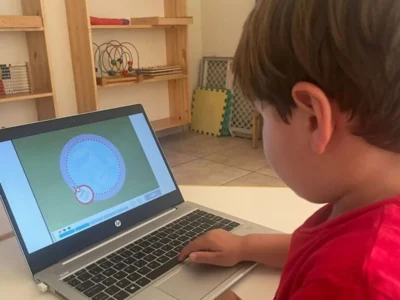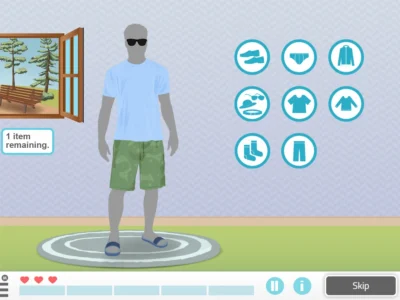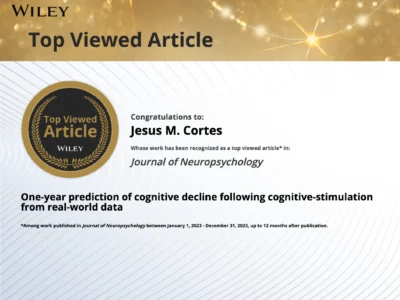In this article, researcher Antonio Javier Sutil Jiménez presents the most important data from the study “Reliability and Validity of Smartphone Cognitive Tests for Frontotemporal Lobar Degeneration”.
Why is this study of cognitive tests for frontotemporal lobar degeneration important?
Frontotemporal lobar degeneration (FTLD) is a neurodegenerative disorder that causes dementia syndromes. FTLD affects the frontal and temporal lobes of the brain and produces impairments in behavior, cognition, language and/or motor function.
Although it is the most common type of dementia in people under 60 years of age, it is not well understood, since each individual experience with FTLD is unique and it is difficult to predict how the disease will progress.
ALLFTD Consortium
From this need the ALLFTD consortium arises, from which this study was born. The ALLFTD consortium is a project whose objective is to build a cohort of patients with FTLD at expert centers who can be available for the study of potential treatments in clinical trials. Specifically, they aim to collect data on cognitive and behavioral assessments, neuroimaging, blood and cerebrospinal fluid. And with these they seek to:
- Identify clinical measures and biomarkers that may be useful for monitoring patients with FTLD in treatment trials.
- Identify clinical measures and biomarkers that indicate when a person at high risk of developing FTLD due to a mutation will begin to show symptoms.
- Share participants’ data, images and samples with other researchers to expand knowledge about the disorder.
This study arises from the data collected by the ALLFTD consortium, which seeks to overcome some of the existing barriers by making use of smartphone technology.
Some of these limitations are:
- The need for frequent visits to caregivers or physicians, which entail a large cost in the conduct of clinical trials;
- the geographic dispersion of participants eligible for these studies;
- or the lack of sensitive neuropsychological tests that detect the disease at an early stage.
As a solution, the use of smartphones is proposed for the remote collection of data that can be reliable and valid. Although it may seem surprising, preliminary evidence supports the use of smartphones as a method to administer cognitive and motor assessments remotely in older adults at risk of other diseases such as Alzheimer’s, Parkinson’s or Huntington’s.
In this particular study, the ALLFTD mobile application (ALLFTD-mApp) was used with the aim of studying its validity in assessing executive function and memory in an FTLD cohort.

Subscribe
to our
Newsletter
What was done?
To carry out the study they took a sample of 360 patients from 1,160 eligible. This sample was divided into two cohorts that did not differ significantly in demographic terms, disease severity or cognition. These cohorts were identification (n = 258) and validation (n = 108).
Cognitive tasks performed
Participants set up the app with initial help from the researchers, but they self-administered the cognitive tasks in three half-hour sessions without supervision. All tests were repeated every six months to assess test-retest reliability.
The tasks they performed included:
- An adaptive associative memory task and gamified versions of the flanker task, Stroop,
- 2-back,
- go/no-go,
- and the card sorting test (see figure 1 of the original article to view the tasks).
Clinical and neuropsychological assessments
In addition to these tasks, patients completed multiple clinical and neuropsychological assessments along with neuroimaging and genetic measures. Among these measures, two neuropsychological tests stand out that will be used in the test phase to validate the technology:
- The Montreal Cognitive Assessment (MoCA), which is a screening test,
- and the UDS3-EF score, which is a combined measure of executive function tests and processing speed.
Analysis
To meet the proposed objective, three different analyses were performed.
Reliability analysis
The first was an within-task reliability analysis, estimated with participants’ first completion of the test through internal consistency and test-retest reliability measured with those who completed the task at least twice.
Estimated reliability is described as low (<0.50), moderate (0.50-0.74), good (0.75-0.89) and excellent (>0.90). For more detailed results, see Table 1, which shows a simplification of the results obtained for the total sample (combined) and the two cohorts (Identification and Validation).
| Tasks | Internal consistency (Cronbach’s Alpha) | Test-retest reliability (ICC, interclass correlation coefficient) |
|---|---|---|
| Flanker | ||
| Combined | 0.99 | 0.95 |
| Identification | 0.99 | 0.95 |
| Validation | 0.99 | 0.95 |
| Stroop | ||
| Combined | 0.84 | 0.84 |
| Identification | 0.83 | 0.84 |
| Validation | 0.88 | 0.84 |
| 2-Back | ||
| Identification | 0.92 | 0.77 |
| Detection | 0.92 | 0.80 |
| Validation | 0.92 | 0.64 |
Validation analysis
The second part of the analysis was validation, which was carried out in a subgroup of 57 asymptomatic participants.
It was observed that older age was associated with poorer performance on most cognitive tests, except on the card sorting test and the go/no-go test, which was to be expected. Associations with sex and educational level were not significant.
The cognitive tests administered via the app showed evidence of convergent and divergent validity, with very similar results in the identification and validation cohorts.
Executive function measures based on the ALLFTD-mApp generally correlated with standard measures of these domains and less so with measures of other cognitive domains.
For example, the flanker task was associated with a composite measure of executive functions, as well as with visuoconstruction and naming measures. The ALLFTD-mApp memory test was also associated with standard memory and executive function tests.
Area analysis
Finally, an area under the curve analysis (AUC) was performed, in which the app’s validity was evaluated to differentiate asymptomatic participants from those who are in a prodromal or symptomatic stage.
| Asymptomatic vs Prodromal (Identification) | Asymptomatic vs Prodromal (Validation) | |
|---|---|---|
| ALLFTD-mAPP | 0.82 | 0.81 |
| UDS3-EF | 0.80 | 0.83 |
| MoCA | 0.69 | 0.67 |
What are the main conclusions of this study of cognitive tests for frontotemporal lobar degeneration?
In conclusion, it can be inferred that the use of a smartphone is potentially a valid and reliable tool for the assessment of frontotemporal dementia from early stages. This is supported by previous studies and by the results of this study, which show excellent values in reliability and validation measures for most tasks.
As shown in Table 2, the mobile app presents equal or better results in distinguishing between asymptomatic and prodromal groups compared with other cognitive assessment methods, such as UDS3-EF or MoCA.
Since this study only explores some cognitive domains, extending its use to other measures could be of future interest to improve early diagnostic accuracy.
Therefore, it is proposed that smartphones can complement traditional research paradigms, such as in-person assessments. This is because they can facilitate access for people who have difficulty reaching assessment centers and, moreover, can reduce the costs of in-person assessments.
More generally, the scalability, ease of use, reliability and validity of the ALLFTD-mApp suggest that it is a useful tool for conducting remote digital assessments in dementia clinical trials.
Where could NeuronUP contribute to a study like this?
NeuronUP can contribute to this study in several ways.
- First, in generalizing these results to cohorts that are geographically and psychosocially more different than those in this study—predominantly white, with average university education, mostly English-speaking. NeuronUP’s access to a population with greater sociodemographic diversity and the lack of restriction to English-speaking populations are some of the strengths where it could be useful, providing greater diversity and equity in access. In addition, NeuronUP’s large variety of materials (more than 3000 different items) grouped into several cognitive functions can help to understand cognitive functioning more comprehensively.
- On the other hand, extending this work to other types of dementia could be very enriching. This is because diagnostic accuracy could be improved at early stages, where it is most crucial but also most difficult to pinpoint.
*ALLFTD is a project co-led by Dr. Brad Boeve of Mayo Clinic in Rochester, Minnesota, and Drs. Adam Boxer and Howard Rosen of the University of California, San Francisco (UCSF).
References
- All FTD. (n.d.). All FTD. https://www.allftd.org/
- Staffaroni AM, Clark AL, Taylor JC, Heuer HW, Sanderson-Cimino M, Wise AB, Dhanam S, Cobigo Y, Wolf A, Manoochehri M, Forsberg L, Mester C, Rankin KP, Appleby BS, Bayram E, Bozoki A, Clark D, Darby RR, Domoto-Reilly K, Fields JA, Galasko D, Geschwind D, Ghoshal N, Graff-Radford N, Grossman M, Hsiung GY, Huey ED, Jones DT, Lapid MI, Litvan I, Masdeu JC, Massimo L, Mendez MF, Miyagawa T, Pascual B, Pressman P, Ramanan VK, Ramos EM, Rascovsky K, Roberson ED, Tartaglia MC, Wong B, Miller BL, Kornak J, Kremers W, Hassenstab J, Kramer JH, Boeve BF, Rosen HJ, Boxer AL; ALLFTD Consortium. Reliability and Validity of Smartphone Cognitive Testing for Frontotemporal Lobar Degeneration. JAMA Netw Open. 2024 Apr 1;7(4):e244266. doi: 10.1001/jamanetworkopen.2024.4266. PMID: 38558141; PMCID: PMC10985553.
If you enjoyed this blog post about the reliability and validity of smartphone cognitive tests for frontotemporal lobar degeneration, you will likely be interested in these NeuronUP articles:
“This article has been translated. Link to the original article in Spanish:”
Fiabilidad y validez de las pruebas cognitivas con smartphone para la degeneración lobular frontotemporal







 Brain–Heart Health: The Relationship Between Heart Disease and Cognitive and Brain Impairment
Brain–Heart Health: The Relationship Between Heart Disease and Cognitive and Brain Impairment
Leave a Reply